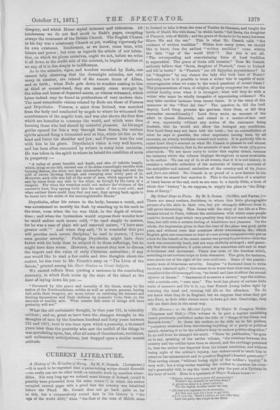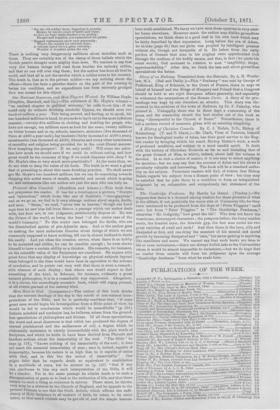The Bivouac ; or, the Martial Lyrist. By Major R.
Compton Noake. (Chapman and Hall.)—This volume is in part a reprint containing verses previously published under the title of " Songs of the Camp and Barrack-room." In these the author, so he tolls us in his preface, "purposely abstained from introducing anything of a party or political nature, deeming it to be the soldier's duty to eschew polities altogether." In an evil hour he changed his mind. "Since its publication," he goes on to say, speaking of the earlier volume, "the relations between the country and the soldier have been so altered, and the roviliugs persisted in, that the author has departed from hie former resolution, and without losing eight of the soldier's loyalty, has endeavoured to teach him to retort on his calumniators and to question England's boasted generosity." That saving clause, "without losing sight of the soldier's loyalty," is very well ; but a song-writer teaching the soldier to question his coun- try's generosity will, to say the least, not play the part of a Tyrtams in the hour of need. Here is a specimen of Major Noake'e muse:— . Britons, where now is your old generosity ? Where's the reward for services dune? A generous deed is a great curiosity, Ms the eighth wonder under the sun.
"All that you legislate for is economy, All that you care for's how to get rich; All of you cry, 'Here's Justice, so run who WY. Lest our party she coupe in the ditch.' -
" See the old soldier there, lingering in poverty, Broken by twelve years of battle and clime, As he's no legal claim blacker your perfidy; Bought and beguiled, you squandered his prime.
" Ragged regimentals show your generosity; Want's the reward for services done; A veteran cared for's a great curiosity, Wonder of wonders under tho sung' There is nothing Tory dangerously seditious about melodies such as these. They are certainly not of the stamp of those ballads which the Scotch patriot thought more mighty than laws. We venture to say that very few human beings will read thorn besides the unlucky critics, and that no one will over sing them ; but the author has done all that ho could, and that all is not the service which a soldier owes to his country. The truth is, that as to the private soldier—we say nothing about the officer—there has been a genuine desire on the part of the country to better his condition, and no expenditure has been seriously grudged that was meant for this object.



































 Previous page
Previous page